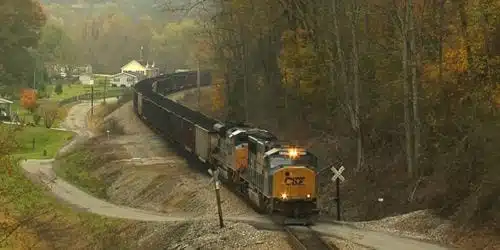
There are things going on in the neighborhood.
— Terry Ratliff
“I was quite a dreamer in my younger days,” says Terry Ratliff. As he speaks, he’s working on one dream, his log house in eastern Kentucky. His shoulder-length hair pulled back in a ponytail, he gestures to the porch to illustrate: “There’s nothing straight true or level in that corner,” he explains as the camera pans to show the corner, which looks plenty sturdy. “That’s my way of being a little rebellious to carpenters.”
Terry’s sense of rebellion is in his blood. He’s a small business owner, as he explains in Deep Down: “At different points in my career, I’ve had low spots.” In an effort to shore up against those spots, he decided last January to accept an offer from a land agent concerning Terry’s six acres. “He wanted to get a deal done in two weeks,” Terry remembers: $75,000, he says, “not for sale, for lease.”
The agent was working for the Miller Brothers Coal Company, and just as you’ve guessed, the deal he offered was too good to be true. And all around Terry’s property, the camera shows the effects of such a deal: mountaintops stripped off, leaving long, wide gashes. Terry’s neighbor, Beverly May, describes the risk to his dream house: “He’s in a really, really vulnerable situation there, where I cannot imagine how his house is going to survive the blasting,” she says. “He’s got a lot at stake there.”
Miller Bros.’ ravages — sometimes subtle, more often overt — shape the lives of Terry and Bev and many of their neighbors on the mountain. Their efforts to survive are recounted in Deep Down, which premiered last month as part of PBS’ Independent Lens, and which offers as well a “virtual mine” online, created in Second Life. As the film shows the struggle and culture of the longtime landowners, the game aims to help players understand the process of mountaintop removal as well as alternative energies and Appalachian music and traditions.
The film reveals the knotty conflicts between past and present, as well as workers and owners/management. Gary Usely describes mountaintop removal with help of a map and drawing: “You take a layer off at a time,” he says, “Kind of like peeling an onion.” He notes his unusual status, as both a Sierra Club member and strip mining advocate, but explains it in terms of money: “It’s just a matter of having to extract resources in order to drive the economic engines that run the country.”
If it’s not news that profits trump cultural traditions, Deep Down makes clear that the seeming options presented to Appalachian denizens is straightforward. As Terry ponders his way forward, Bev speaks out at community meetings, protesting the company’s destruction of land and history, not to mention whatever future might depend on the local environment. Even so, she can empathize with the plights miners and their families, who declare their need for income, and their frustration that someone like Bev wants to stop the mining. “God gave us resources for us to use ’em,” declares one woman, “And coal is one of ’em. and we get to it how we can. I mean, Texas has oil, Idaho has potatoes, and we have coal.”
Her presentation is striking, not only for her assertion of faith per se, but also for her faith that consuming is ordained. A miner grounds his presentation in day-to-day experience: it’s hard to see protestors at his place of work. “The way that you look at us is pretty bad, you don’t look at both sides,” he says, “So, you look at me the way you want to, but you know that deep down, at the back of your hearts, you’re wrong.” As he articulates the film’s title, its complexity is clear: each speaker believes in his own experience, and each wants earnestly to be heard by his neighbors. Just so, family nurse practitioner Bev May recounts her experiences with uninsured miners at a local clinic. “I see everyday people who are your brothers,” she says, “You are not my enemy and I’m not yours. We’re all victims of the same coal companies. It’s just that you’re on the top of the mountain and I’m down at the bottom.”
Of course, it’s hard to take a broad view when you have kids in need of food and shoes. Or if you, like Terry, feel pressured by an offer that seems too good to be true. Another woman underlines the coal company’s most important and troubling asset, its apparent necessity. “When you say coal is the only job that we have,” she asks, “Why is coal the only job that we have? After 100 years, you would think it would have brought some prosperity to this region instead of destruction.”
The question of time runs alongside all the concerns about immediate effects. The film showcases Bev’s patient, ongoing efforts to organize her neighbors and bring their case against the company to court. “You don’t regulate an abomination,” she says. “You stop it.” Knowing “we’re up against a lot of money,” she smiles, “I think of it as Sisyphus rolling the big rock up the hill just so that the gods can chuck it back down and then he has to go back and roll the ball up the hill again and this goes on for all eternity.” She persists.

